Perspectives is an opportunity for Fellows and others to share their ideas in short, accessible essays. IPE/BC Fellows hold a range of views and interests relative to public education.
Monopoly Technology Platforms are Colonizing Education
By Larry Kuehn
The exposés of abuse by social media corporations like Google and Facebook have finally brought attention to the dangers of monopolies over our communications. The way these monopolies have been colonizing public education has, however, gone almost unnoticed. This is rampant privatization sneaking in as essential to “21st Century learning.”
The top five global capital corporations are technology platforms—Apple, Google, Microsoft, Amazon and Facebook. Platforms are a host for a variety of services and uses. All of the big five platform corporations have become too large in a short period of time to have any significant competition outside of this group. They compete against one another, adding services to secure their monopoly by offering users everything they do online.
If a new service is developed that seems to be gaining users, or that competes with an element of their platform, it is purchased and integrated into the platform—avoiding new competitors. Alternatively, they use their massive resources to develop a comparable app and push the potential competitor aside.
Snicek, in Platform Capitalism, points out that the development of these monopolies “introduces new tendencies within capitalism that pose significant challenges to a post-capitalist future.” Building public cooperative platforms becomes an impossible dream.
No surprise—these platforms have moved to colonize education. Public education represents a big chunk of potential revenue. Just as importantly, schools are where one can find most of the future potential consumers and users of the platform services.
Colonization is a process where a significant force moves into an area and dominates. It takes over not only the production and resources, but imposes—often by stealth and power—the processes and approaches and even values of the social and cultural environment. And, dominate is what the monopoly platforms are on track to do in public education.
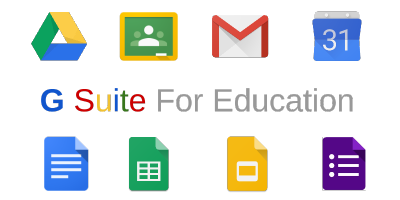 The most successful colonizer has been Google. A recent report indicates that Google’s G-Suite for Education is being used by half the teachers and students in the U.S. Canada is fast approaching the same level of use. It includes a range of free software tools that can be used by students and teachers—word processing, presentations, spread sheets and the like. G-Suite incorporates “Classroom,” an integrated learning management system that keeps track of grades, attendance and more. And, of course, YouTube is linked to student use.
The most successful colonizer has been Google. A recent report indicates that Google’s G-Suite for Education is being used by half the teachers and students in the U.S. Canada is fast approaching the same level of use. It includes a range of free software tools that can be used by students and teachers—word processing, presentations, spread sheets and the like. G-Suite incorporates “Classroom,” an integrated learning management system that keeps track of grades, attendance and more. And, of course, YouTube is linked to student use.
New elements are added frequently. “Google Sites” is promoted for student e-portfolios, because “every student should publish for the world.” Google acquired Workbench, integrated with Google Classroom to give “lessons connected to a variety of ‘maker’ activities focused on STEM.” It is part of Google’s plan to “help schools and educators address their universal needs around education content.”
Google, rather than democratic public institutions, therefore shapes what is on offer. Google’s position as colonizer is strengthened by the hardware increasingly used in schools—the Google Chromebook. 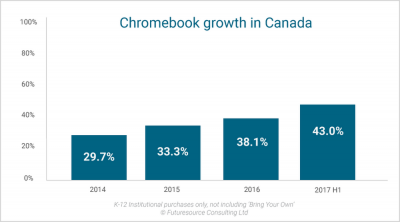 It is less expensive than other computers because much of what it needs to operate is supplied by Google in the cloud—operating software, applications and memory. No need to build those into the computer. According to market reports, Chromebooks make up the majority of all computers sold to schools in the U.S. and are marketed globally.
It is less expensive than other computers because much of what it needs to operate is supplied by Google in the cloud—operating software, applications and memory. No need to build those into the computer. According to market reports, Chromebooks make up the majority of all computers sold to schools in the U.S. and are marketed globally.
However, one must have a gmail account to use these Google tools—so if a parent wants to protect the privacy of their child and refuses a gmail account that kid is left out while the rest of the class works away on their Chromebook and other Google tools. (See here the kind of consent form parents are asked to sign, giving Google access to acquire and store student information outside of Canada.)

Google has even taken up teaching “internet safety,” with a program aimed at reaching 5 million students. Its core is a game for students in Grades three to six to teach them to avoid “schemers, hackers and other bad actors.” However, as critics point out, it doesn’t talk about privacy concerns when users’ personal information and actions are tracked online. Google conveniently ignores its role as a “bad actor.”
A Swedish study of Google’s strategy concluded that “By making an implicit demarcation between two concepts (your) ‘data’ and (collected) ‘information’ Google can disguise the presence of a business model for online marketing and, at the same time, simulate the practices and ethics of a free public service institution.”
In “The Weaponization of Education Data,” Audrey Watters points out “the risk isn’t only hacking. It’s amassing data in the first place. It’s profiling. It’s tracking. It’s surveilling.”
Google isn’t alone in the business of colonizing education and student data—just the most successful so far. One competitor is Microsoft 365 Education, with a promise of “empowering every student on the planet to achieve more” and that it will “unlock limitless learning.”
It’s not an accident that it is “Microsoft 365” that is being pushed. It offers a cloud-based software and cloud storage for your work. It is the new business model for Microsoft: they don’t sell you software, you rent it—and you keep paying for it. And your work isn’t saved on your own computer, so you have to keep up your subscription. Like Google, they are hoping that students will keep using their tools when they finish being students.
Microsoft is imitating much of what Google offers, but by charging for the service rather than trading it for data. It offers apps, educator training and STEM lessons “to enrich science, technology, engineering and math classes.” They offer “budget friendly” Windows 10 devices with licences for Microsoft 365 Education.
The other major tech corporations have programs as well. Apple, for example, was the first into education with the Apple IIe and the “Apple Classroom of Tomorrow” way back in the 1980s. More recently it depended on the ease of use of the iPad, despite its cost, to sell classroom sets along with Pearson curriculum in an ill-fated project with Los Angeles schools.
Venture capitalists are hoping to find the magic app that will make a fortune. The potential market is indicated by expenditure of hundreds of millions each year on developing new products. The “winners” are likely to be bought up by one of the major corporations—or find their product idea taken by the monopolies.
Not enough attention is paid by education authorities or researchers to the shaping and distortion of education that is possible—even likely—by this colonization of education by technology monopolies.
Larry Kuehn is an IPE/BC Fellow, IPE/BC director and Director of Research & Technology for the British Columbia Teachers’ Federation.
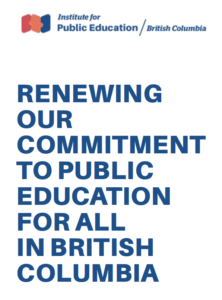
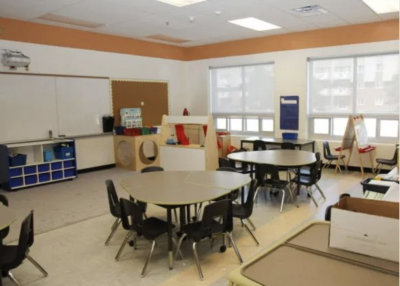 You can check out our analysis of public funding for private schools in BC, and our arguments for discontinuing these subsidies to private schools,
You can check out our analysis of public funding for private schools in BC, and our arguments for discontinuing these subsidies to private schools, 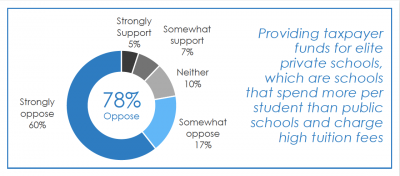 residents across the province. A new poll finds that four-in-five British Columbians (78%) oppose providing taxpayer funds for elite or preparatory private schools in the province, with a total of 60% being strongly opposed to the idea.
residents across the province. A new poll finds that four-in-five British Columbians (78%) oppose providing taxpayer funds for elite or preparatory private schools in the province, with a total of 60% being strongly opposed to the idea.
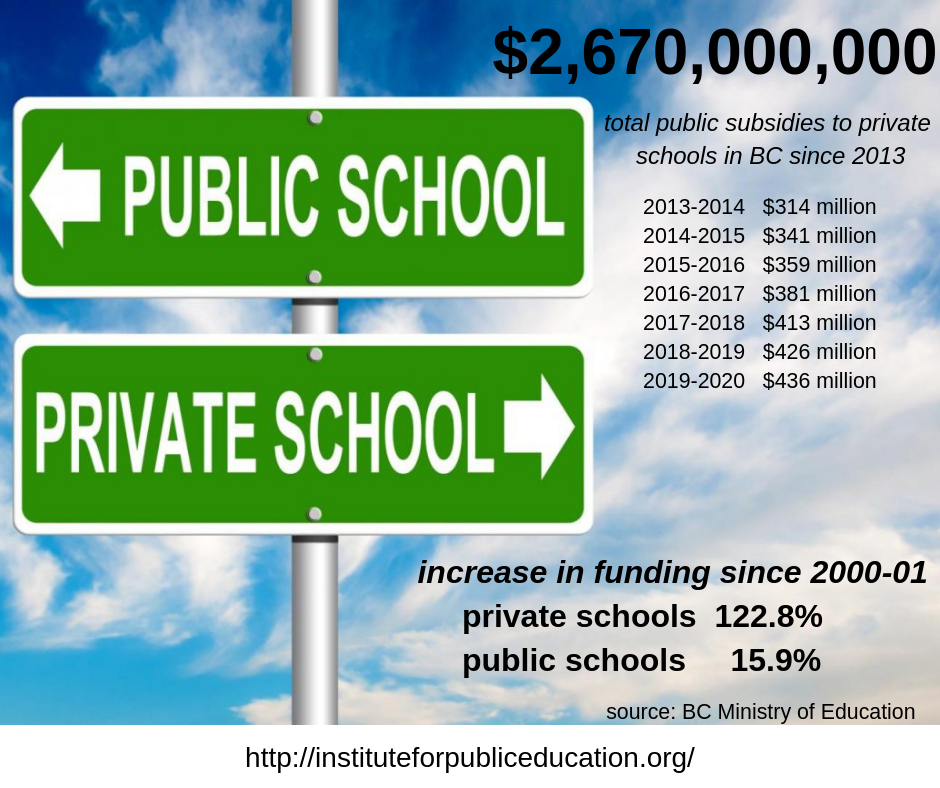
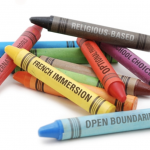 One such feature is school choice. “Choice” takes place in a variety of ways: the open catchment areas; allowing and increasing public funding of private schools; allowing school fees; and promoting niche schools and academies. With only limited opposition (from parents, teachers and school trustees) “choice” policies have changed the nature of BC’s public school system. The impact of these changes is that we are moving from a more comprehensive, equitable, neighbourhood and community oriented, publicly administered school system, towards a semiprivate, stratified and segregated system in which precious limited resources are increasingly allocated to a privileged minority.
One such feature is school choice. “Choice” takes place in a variety of ways: the open catchment areas; allowing and increasing public funding of private schools; allowing school fees; and promoting niche schools and academies. With only limited opposition (from parents, teachers and school trustees) “choice” policies have changed the nature of BC’s public school system. The impact of these changes is that we are moving from a more comprehensive, equitable, neighbourhood and community oriented, publicly administered school system, towards a semiprivate, stratified and segregated system in which precious limited resources are increasingly allocated to a privileged minority. Yet another form of school choice is the Academy, or niche program. There are sports academies, and arts academies, but also academic academies such as International Baccalaureate programs, honours programs, and challenge programs. These
Yet another form of school choice is the Academy, or niche program. There are sports academies, and arts academies, but also academic academies such as International Baccalaureate programs, honours programs, and challenge programs. These 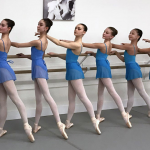 specialty programs often have competitive enrolment processes, and often require the payment of school fees (typically $2000 – $5000, but as much as $17,000/year). Thus, they are available only to a small subset of students.
specialty programs often have competitive enrolment processes, and often require the payment of school fees (typically $2000 – $5000, but as much as $17,000/year). Thus, they are available only to a small subset of students.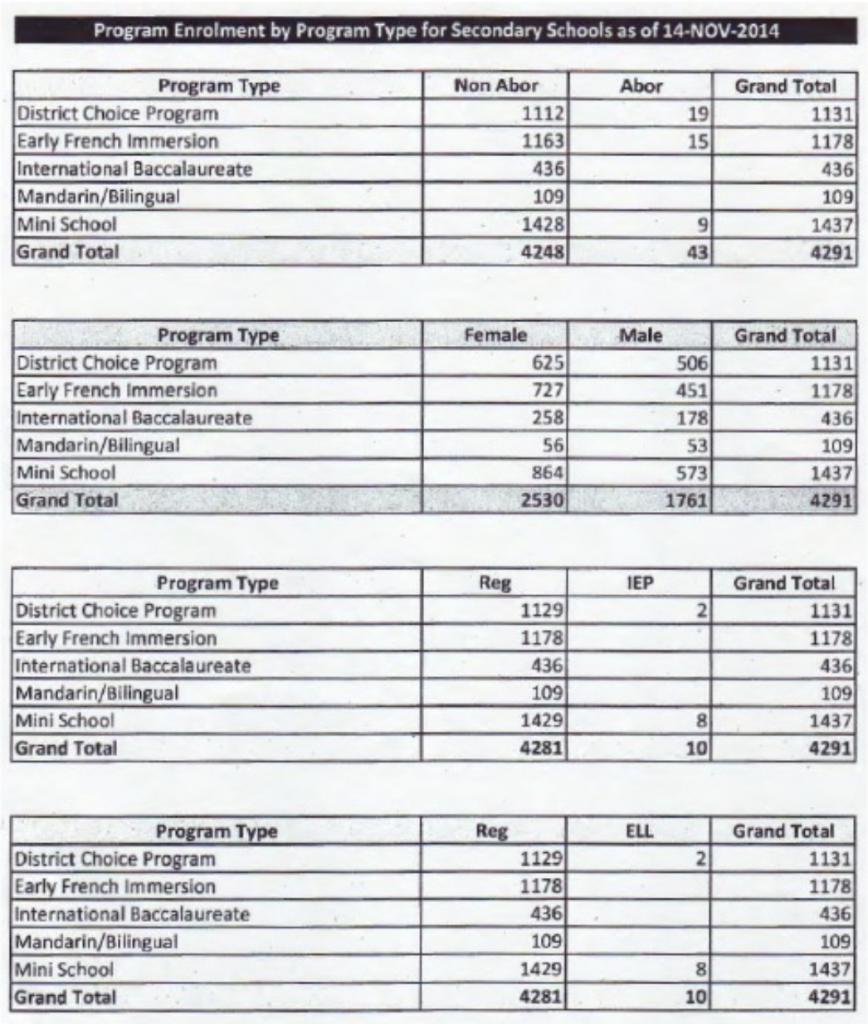
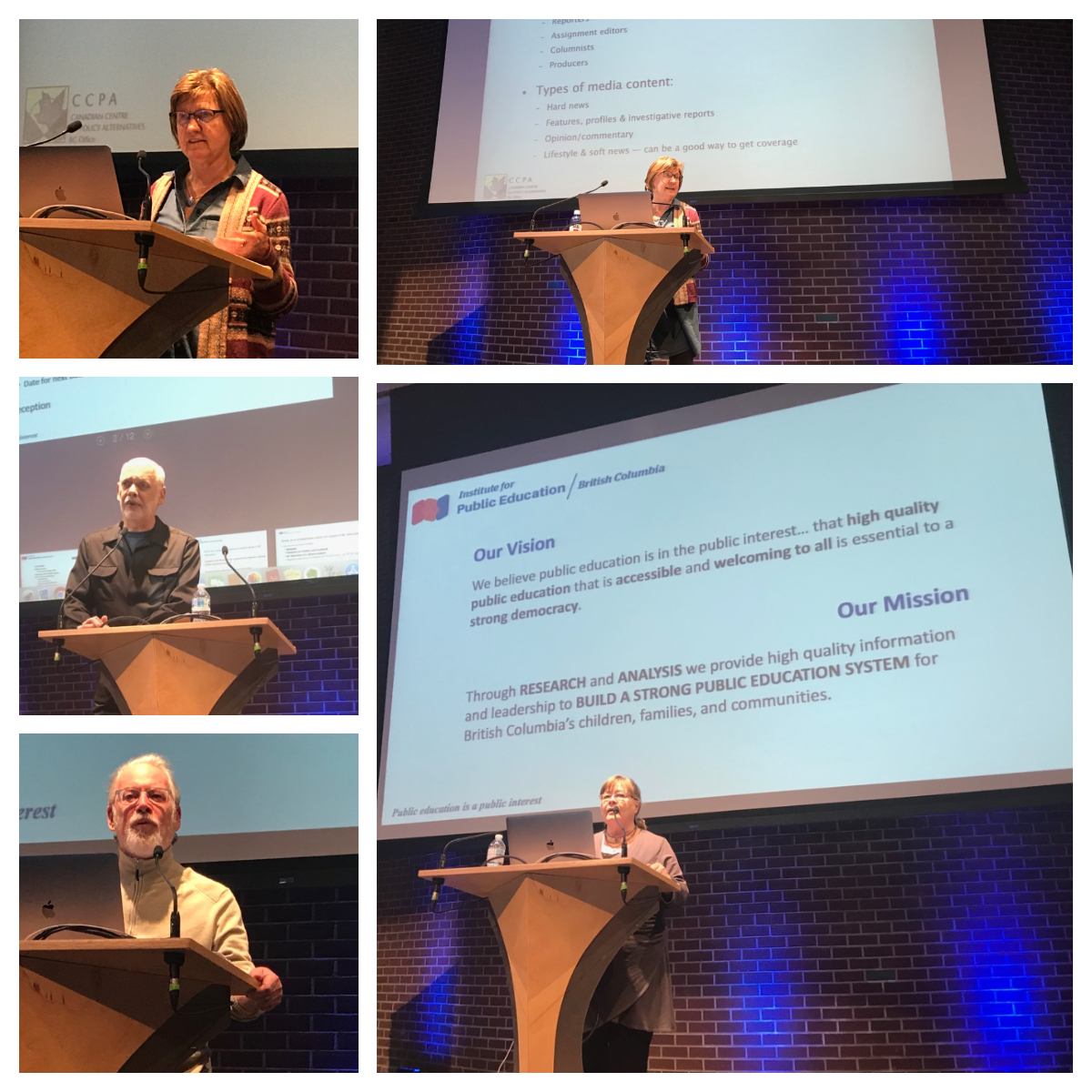
 The most successful colonizer has been Google. A recent report indicates that Google’s G-Suite for Education is being used by half the teachers and students in the U.S. Canada is fast approaching the same level of use. It includes a range of free software tools that can be used by students and teachers—word processing, presentations, spread sheets and the like. G-Suite incorporates “Classroom,” an integrated learning management system that keeps track of grades, attendance and more. And, of course, YouTube is linked to student use.
The most successful colonizer has been Google. A recent report indicates that Google’s G-Suite for Education is being used by half the teachers and students in the U.S. Canada is fast approaching the same level of use. It includes a range of free software tools that can be used by students and teachers—word processing, presentations, spread sheets and the like. G-Suite incorporates “Classroom,” an integrated learning management system that keeps track of grades, attendance and more. And, of course, YouTube is linked to student use. It is less expensive than other computers because much of what it needs to operate is supplied by Google in the cloud—operating software, applications and memory. No need to build those into the computer. According to market reports, Chromebooks make up the majority of all computers sold to schools in the U.S. and are marketed globally.
It is less expensive than other computers because much of what it needs to operate is supplied by Google in the cloud—operating software, applications and memory. No need to build those into the computer. According to market reports, Chromebooks make up the majority of all computers sold to schools in the U.S. and are marketed globally.
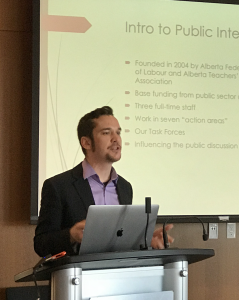 On December 7th, IPE/BC (with the support of Your Education Matters) held a Think Tank to discuss the wide range of issues around privatization in public education in British Columbia. IPE/BC Fellows, teachers, researchers, and community leaders came together to consider what issues to address and how strategically to do so. Joel French, Executive Director of
On December 7th, IPE/BC (with the support of Your Education Matters) held a Think Tank to discuss the wide range of issues around privatization in public education in British Columbia. IPE/BC Fellows, teachers, researchers, and community leaders came together to consider what issues to address and how strategically to do so. Joel French, Executive Director of